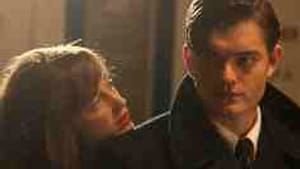Stay in the Loop
BSR publishes on a weekly schedule, with an email newsletter every Wednesday and Thursday morning. There’s no paywall, and subscribing is always free.
Catholics without Catholicism
Rowan Joffé's remake of "Brighton Rock'

Rowan Joffé's update of Graham Greene's chilling 1938 classic, Brighton Rock, doesn't disgrace itself in comparison with the novel or the 1947 film adaptation starring a youthful (and terrifying) Richard Attenborough. But Greene's novel hinges on the passionate-unto-psychosis Catholicism of the two leads: the cruelly violent teen gangster Pinkie Brown and his easily manipulated girlfriend Rose. Without that powerful religious underpinning, the story doesn't make much sense.
Brighton Rock is a portrait of three characters. Pinkie Brown (Sam Riley), a viciously austere young English gangster, doesn't smoke, drink, whore, joke or gamble. Instead, he's motivated by ambition— he wants to run the city of Brighton— and a creepily intense Catholicism. ("Of course there's a hell. It's the only thing that makes any sense.") When the leader of his dingy, seafront gang is assassinated, Pinkie quickly murders one of those responsible and takes over the criminal enterprise, such as it is, for himself.
Rose (Andrea Risborough) is a naÓ¯ve and mousy waitress at a local eatery who owns a piece of evidence that could incriminate the young thug. Fatefully, she too is a Catholic, a fact that Pinkie uses to get close with her.
Mirren's bit of fun
Meanwhile, Ida Arnold (Helen Mirren) is a casually atheistic local loudmouth who loves a bit of fun: whiskey, bawdy humor and casual sex are her raisons d'être. Ida is the counterpoint to Pinkie's worldview, and she makes it her mission to bring him to worldly justice.
All told, Brighton Rock isn't a particularly pleasant tale. We spend a lot of time with the switchblade-wielding Pinkie and his voracious hatred for nearly everything and everyone. He isn't very good company, which is something you think Rose might notice and shy away from, especially after he repeatedly threatens and taunts her.
Even in Greene's novel, their relationship is a bit of a stretch. But at least he makes the pair's deeply felt Catholicism the basis of their connection— a matter of particular importance in predominantly Anglican England.
Fear of hellfire
But Joffé's film elides the couple's religiosity. Beyond a bit of praying, a few images of crucifixes and Pinkie's mumbled reasoning that they're both "Romans" and should therefore be together, Brighton Rock doesn't do much with the Catholicism that lies at the heart of its source material. Without an understanding of Pinkie's fear of, and fascination with, eternal hellfire, it becomes less clear what motivates his character, particularly after it becomes clear that his gang is no longer a power player in Brighton.
Far more damaging to the film's credibility, we don't understand why Rose would ever put up with Pinkie's noxious personality, not to mention his murderous tendencies. Why does she fling herself gladly towards self-destruction? Rose is clearly meant to love Pinkie, but we never understand why.
In the novel, Rose stays with Pinkie because of her powerful belief that she may be able to save his soul. We don't get a sense of this in the film. It's hard to see why anyone would fall for a line like, "You're good and I'm bad. It means we are meant for each other." Instead of seeming tragically innocent, Rose's motives are merely inexplicable.
Absence of passion
It makes sense that Joffé would downplay Brighton Rock's Catholicism. Such unbridled religiosity is hard to depict on the big screen (or the small screen, as viewers of the BBC's otherwise mesmerizing 1981 version of Brideshead Revisited found). But there isn't much else to Brighton Rock.
Yes, there's the gangster story line, but that diminishes in importance as the story unfolds. (Greene began his novel as a thriller, which explains why the first chapter, where Pinkie and his gang hunt and kill a local journalist, is so terrifyingly absorbing.)
The real action in Brighton Rock isn't gang warfare; it's the battle between Ida's vivacious ideology and Pinkie's asceticism. But Helen Mirren's Ida isn't given much to do, and her ribald philosophy is downplayed. In the end, her character isn't very well rounded; we never really feel the obsession that supposedly sets her against Pinkie.
This lack of animating passion is the principal problem with Brighton Rock. If Ida's love of life were more evident, or if Rose's desire to save Pinkie's soul were present at all, life would have breathed into these characters. Instead, we have a merely adequate gangster film and three main characters with disappointingly vague motivations.
Brighton Rock is a portrait of three characters. Pinkie Brown (Sam Riley), a viciously austere young English gangster, doesn't smoke, drink, whore, joke or gamble. Instead, he's motivated by ambition— he wants to run the city of Brighton— and a creepily intense Catholicism. ("Of course there's a hell. It's the only thing that makes any sense.") When the leader of his dingy, seafront gang is assassinated, Pinkie quickly murders one of those responsible and takes over the criminal enterprise, such as it is, for himself.
Rose (Andrea Risborough) is a naÓ¯ve and mousy waitress at a local eatery who owns a piece of evidence that could incriminate the young thug. Fatefully, she too is a Catholic, a fact that Pinkie uses to get close with her.
Mirren's bit of fun
Meanwhile, Ida Arnold (Helen Mirren) is a casually atheistic local loudmouth who loves a bit of fun: whiskey, bawdy humor and casual sex are her raisons d'être. Ida is the counterpoint to Pinkie's worldview, and she makes it her mission to bring him to worldly justice.
All told, Brighton Rock isn't a particularly pleasant tale. We spend a lot of time with the switchblade-wielding Pinkie and his voracious hatred for nearly everything and everyone. He isn't very good company, which is something you think Rose might notice and shy away from, especially after he repeatedly threatens and taunts her.
Even in Greene's novel, their relationship is a bit of a stretch. But at least he makes the pair's deeply felt Catholicism the basis of their connection— a matter of particular importance in predominantly Anglican England.
Fear of hellfire
But Joffé's film elides the couple's religiosity. Beyond a bit of praying, a few images of crucifixes and Pinkie's mumbled reasoning that they're both "Romans" and should therefore be together, Brighton Rock doesn't do much with the Catholicism that lies at the heart of its source material. Without an understanding of Pinkie's fear of, and fascination with, eternal hellfire, it becomes less clear what motivates his character, particularly after it becomes clear that his gang is no longer a power player in Brighton.
Far more damaging to the film's credibility, we don't understand why Rose would ever put up with Pinkie's noxious personality, not to mention his murderous tendencies. Why does she fling herself gladly towards self-destruction? Rose is clearly meant to love Pinkie, but we never understand why.
In the novel, Rose stays with Pinkie because of her powerful belief that she may be able to save his soul. We don't get a sense of this in the film. It's hard to see why anyone would fall for a line like, "You're good and I'm bad. It means we are meant for each other." Instead of seeming tragically innocent, Rose's motives are merely inexplicable.
Absence of passion
It makes sense that Joffé would downplay Brighton Rock's Catholicism. Such unbridled religiosity is hard to depict on the big screen (or the small screen, as viewers of the BBC's otherwise mesmerizing 1981 version of Brideshead Revisited found). But there isn't much else to Brighton Rock.
Yes, there's the gangster story line, but that diminishes in importance as the story unfolds. (Greene began his novel as a thriller, which explains why the first chapter, where Pinkie and his gang hunt and kill a local journalist, is so terrifyingly absorbing.)
The real action in Brighton Rock isn't gang warfare; it's the battle between Ida's vivacious ideology and Pinkie's asceticism. But Helen Mirren's Ida isn't given much to do, and her ribald philosophy is downplayed. In the end, her character isn't very well rounded; we never really feel the obsession that supposedly sets her against Pinkie.
This lack of animating passion is the principal problem with Brighton Rock. If Ida's love of life were more evident, or if Rose's desire to save Pinkie's soul were present at all, life would have breathed into these characters. Instead, we have a merely adequate gangster film and three main characters with disappointingly vague motivations.
What, When, Where
Brighton Rock. A film by Rowan Joffé, from the novel by Graham Greene. Opens September 16, 2011 at Ritz Five, 214 Walnut St., (215) 925-7900 or www.facebook.com.
Sign up for our newsletter
All of the week's new articles, all in one place. Sign up for the free weekly BSR newsletters, and don't miss a conversation.

 Jake Blumgart
Jake Blumgart